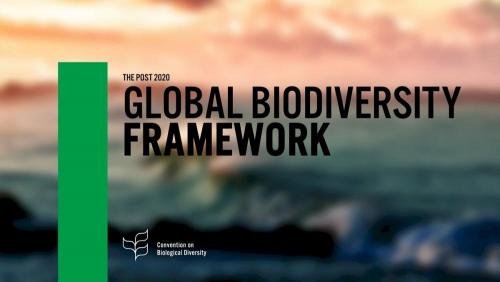
https://ec.europa.eu/commission/presscorner/detail/en/ip_22_1747
The talks in Geneva are the last official session for governments to negotiate on the once-in-a-decade global agreement before it arrives in Kunming, China, to be adopted at the UN Biodiversity Conference COP15 later in the year. The Framework will guide global action for nature and people, which is vital for tackling climate change and building a fairer, safer, healthier world for everyone, everywhere.
Commissioner for Environment, Oceans and Fisheries Virginijus Sinkevičius said: ”In these challenging times, multilateralism is more critical than ever, for people and the nature we depend on. The evidence is clear: we need a future in harmony with nature, for ourselves, for future generations, for our climate and for sustainable development — and we need a common roadmap to achieve it. At COP15, the international community will seek to agree on an ambitious global biodiversity framework with strong monitoring to measure progress on the ground in reversing nature loss. But we are not there yet, and we need to significantly narrow the gaps between Parties' positions. The EU goes to the Geneva negotiations pushing for ambition and leading by example.”
The EU has shown leadership working with like-minded countries towards an ambitious agreement, with measurable targets to address direct and indirect drivers of loss, much stronger provisions on monitoring and review and clarity on the means of implementation.
The EU will negotiate for the following elements of the Framework as a minimum:
- Ambitious, measurable and time-bound goals, milestones, and targets that will aim for all of the world's ecosystems to be restored, resilient, and adequately protected by 2050;
- Targets to address the direct and indirect drivers of biodiversity loss and ensure sustainable use of natural resources, including 30x30 target to protect at least 30% of world's land and oceans by 2030;
- Operational provisions to mobilise finance and other means of implementation; in this context, in September, President von der Leyen announced that the EU will double its international biodiversity financing, in particular for the most vulnerable countries;
- Much stronger implementation, monitoring and review processes, including transparency on intended implementation, reporting, a global gap analysis and stocktake with ratcheting up of efforts if needed;
- Effective implementation of the 3rd Biodiversity Convention objective regarding access to and fair and equitable sharing of the benefits from the use of genetic resources linked to biodiversity, which at the same time guarantees that science, research and innovation can continue to bring full benefits that also support the implementation of the other objectives, and
- Ensuring respect of the rights of indigenous peoples, and full and effective participation by indigenous peoples and stakeholders.
The EU will build on the good outcomes of last week's UN Environment Assembly in Nairobi, including the agreed definition of nature-based solutions, which are essential for nature, people and climate.
Background
The IPBES Global Assessment Report on Biodiversity and the recently released contribution to 6th Assessment Report of the Intergovernmental Panel on Climate Change highlights that the world has a brief, rapidly closing window to secure a liveable future. It calls for urgent actions for the restoration of degraded ecosystems, within the next decade to mitigate the impacts of climate change, notably by restoring degraded wetlands and rivers, forest, and agricultural ecosystems.
The UN Biodiversity Conference (COP15) is taking place in two parts. The first part of took place in Kunming and virtually from 11 to 15 October 2021 with a High-Level Segment. Parties to the Convention on Biological Diversity reaffirmed their commitment to achieving the 2050 Vision of “Living in Harmony with Nature, adopting the Kunming Declaration. This political now has to be translated into concrete political support for an ambitious post-2020 global biodiversity framework and its subsequent full implementation.
The second part of COP15 will take place in-person in Kunming, China later in 2022. At this time, Parties will meet to conclude negotiations and decide on a new Post-2020 Global Biodiversity Framework.
Under the European Green Deal, the European Commission adopted its EU Biodiversity Strategy last year, which aims to put Europe's biodiversity on a path to recovery by 2030. As part of the strategy the Commission is to present a pioneering nature restoration law later this month.
More information
Protecting biodiversity worldwide – towards an international agreement at COP 15










Add new comment